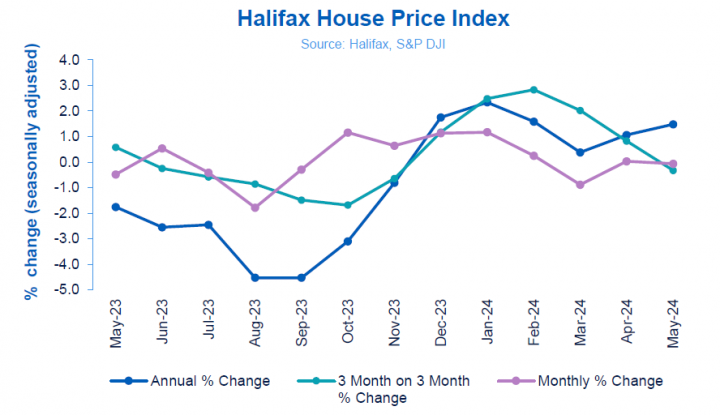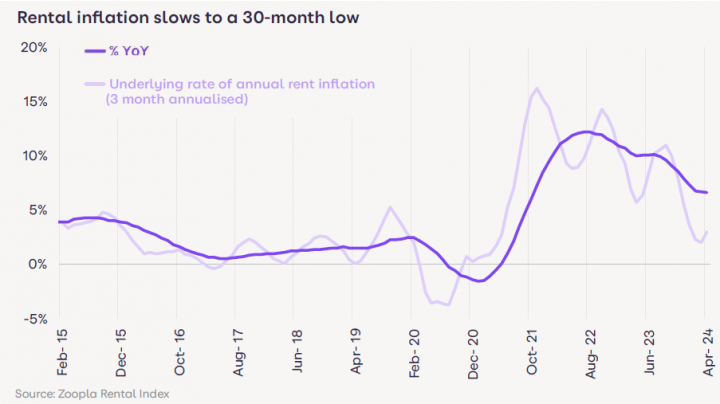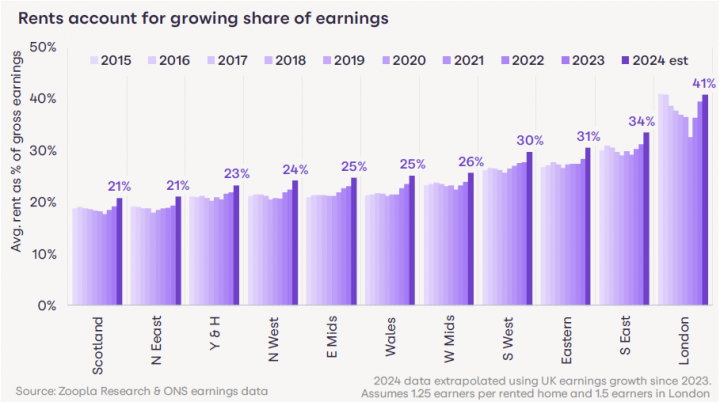UK Property Market Update: Stable House Prices Amidst Slowing Rental Inflation

Recent reports from the Halifax House Price Index and Zoopla Rental Market Report for May 2024 reveal a mixed landscape in the UK property market. House prices remain stable with minor fluctuations, while rental inflation is slowing. These insights highlight how both housing and rental markets are adapting to economic pressures and evolving demand-supply dynamics.
Stability in House Prices
According to the Halifax House Price Index for May 2024, the average house price in the UK experienced a minimal decrease of 0.1% from April, settling at £288,688. This slight dip, amounting to around £170, highlights the market's stability amidst external pressures. Annual growth has also been positive, with house prices rising by 1.5% over the past year, an increase from 1.1% in April. This marks the sixth consecutive month of annual growth, reflecting sustained demand and limited property supply.

Regional Highlights:
- The North West led with a 3.8% annual increase, bringing average prices to £232,258.
- Northern Ireland followed with a 3.2% rise, slightly down from 3.3% in April.
- Scotland saw a 1.9% increase, with an average price of £204,952.
- Wales experienced a modest 0.7% rise, bringing the average price to £219,483.
- Eastern England saw the most significant decline, with prices falling by 0.8% to £329,853.
- London saw a marginal annual increase of 0.2%, with average prices at £536,821.
Looking Ahead
Amanda Bryden, Head of Mortgages at Halifax, noted the overall stability, attributing it to factors like strong nominal wage growth and improved economic confidence. She emphasised that the current interest rate environment provides confidence to both buyers and sellers.
Slowdown in Rental Inflation
The Zoopla Rental Market Report for May 2024 highlights a significant slowdown in rental inflation, now at its lowest rate in 30 months. Annual rental inflation for new lets has dropped to 6.6%, down from 10% a year ago, reflecting weakening demand and affordability constraints. Despite the slowdown, the average monthly rent has increased by £80 over the past year, reaching £1,226.

Regional Rental Trends:
London saw rents increase by just 3.7% annually, a significant drop from over 13% the previous year.
The North East and Scotland experienced higher rental growth rates at 9.5% and 9.3%, respectively.
The underlying rate of rental inflation has fallen to 3%, based on the past three months, indicating a continued deceleration.
Supply and Demand Dynamics:
Rental demand has decreased by 25% from the previous year but remains more than double pre-pandemic levels of 6 between 2017-20, with 15 households currently competing for each rental property.
The supply of rental homes has increased by 18% compared to last year but remains a third below pre-pandemic levels, maintaining upward pressure on rents.
Certain cities, including Nottingham, Brighton, and York, have seen slight rent declines over the last quarter, suggesting localised market adjustments. These modest declines indicate potential turning points in response to supply changes and price-sensitive demand.
Market Influences and Future Outlook
Affordability Constraints: The narrowing gap between rental growth and average earnings is expected to further alleviate rent increases, although strong demand and low rental housing investment will continue to support current rent levels.
Investment Trends: Low levels of new investment by private landlords, influenced by tax changes and recent interest rate increases, have kept the supply of private rented homes static since 2016. Corporate landlords have partially offset this decline, but overall investment remains insufficient to meet high demand.
Economic and Demographic Factors: A resilient labour market and increased demand from overseas students significantly contribute to rental demand. However, the softening labour market and reliance on immigration to fill job vacancies have complex implications for future demand.
Policy and Future Outlook: Zoopla emphasizes the need for specific policies to boost rental housing supply. Despite political focus, substantial progress requires clear plans and goals for the private rented sector's future. The imbalance between supply and demand is unlikely to improve materially over the next 12 months, suggesting continued rent increases even as rental inflation slows.

Conclusion
The UK property market, encompassing both housing and rental sectors, is navigating through economic uncertainties with a mix of stability and challenges. While house prices exhibit remarkable steadiness, the rental market faces a slowdown in inflation amidst persistent supply-demand imbalances. This dynamic ensures ongoing pressure on rents, highlighting the need for effective policy interventions and increased investment to address affordability and supply issues.
The Importance of Expert Guidance
Given the ever-changing market conditions, seeking the assistance of a mortgage consultant is more important than ever. With their expertise, you can navigate these fluctuations effectively and find the best possible mortgage options tailored to your needs.
Our experienced mortgage consultants are ready to assist you with personalised guidance every step of the way. For an initial consultation, speak with our experts or call us at 01628 564631. We're here to help you navigate your mortgage journey with informed advice and care.
Take the first step towards securing your mortgage today.
The information contained within was correct at the time of publication but is subject to change.
Your mortgage is secured on your property. Your property may be repossessed if you do not keep up repayments on your mortgage.
Sources: Zoopla and Halifax


